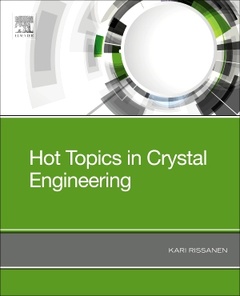Description
Hot Topics in Crystal Engineering
Coordinator: Rissanen Kari
Language: English
Subject for Hot Topics in Crystal Engineering:
Keywords
s-hole interactions; Bending; Brittle; Chalcogen; Cocrystal; Continuous flow; Coordination chemistry; Coordination network; Crystal engineering; Crystallization; Design; Elastic; Function; Halogen; Halogen bonding; Hydrogen bonding; Hydrogen bonds; Intermolecular interactions; Mechanochemistry; Molecular building block; Molecular electrostatic potentials; Molecular recognition; Nanoindentation; Noble gas; Noncovalent interactions; Pharmaceutical cocrystals; Plastic; Pnictogen; Scanning probe mic
298 p. · 19x23.4 cm · Paperback
Description
/li>Contents
/li>Readership
/li>Biography
/li>Comment
/li>
Hot Topics in Crystal Engineering covers the design and synthesis of single crystalline solid-state materials, their properties and applications, focusing on the understanding and use of intermolecular interactions that constitute single crystalline materials. Many of the most modern materials, such as metal-organic frameworks (MOFs) capable of gas storage and separation, and selective entrapment of harmful substances, are the result of the rational use of crystal engineering. Topics covered in this work highlight breakthroughs in this rapidly developing field. This work offers a carefully chosen cross-section of the latest developments, some in their early infancy and some covered for the first time.
1. Surface Self-Assembly of Hydrogen-bonded Frameworks 2. Crystal Engineering of Coordination Networks: Then and Now 3. From Mechanical Properties to Mechanochemistry of Molecular Crystals: Role of Nanointendation and AFM Indentation Techniques in Crystal Engineering 4. A combined theoretical and CSD perspective on s-hole interactions with tetrels, pnictogens, chalcogens, halogens and noble gasses 5. Crystal Engineering and Pharmaceutical Crystallization 6. From molecular electrostatic potential surfaces to practical avenues for directed assembly of organic and metal-containing crystalline materials
Undergraduates, postgraduates and researchers
- Provides comprehensive and authoritative articles, giving readers access to a wealth of information to fully support their research and activities
- Covers the latest developments in crystal engineering, including topics which are in their early infancy
- Written by leading international experts




